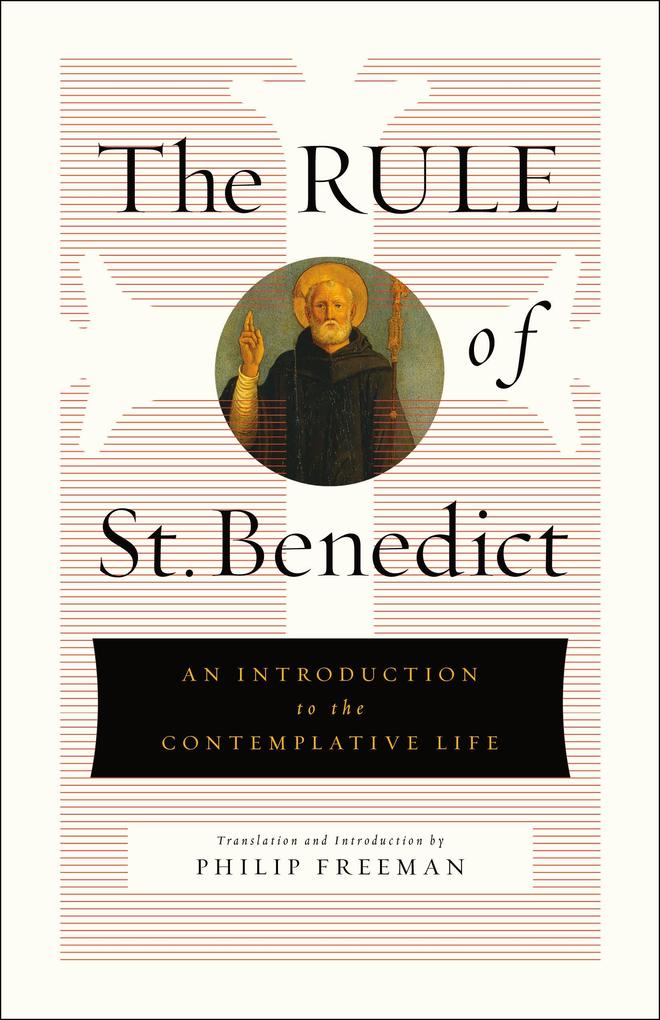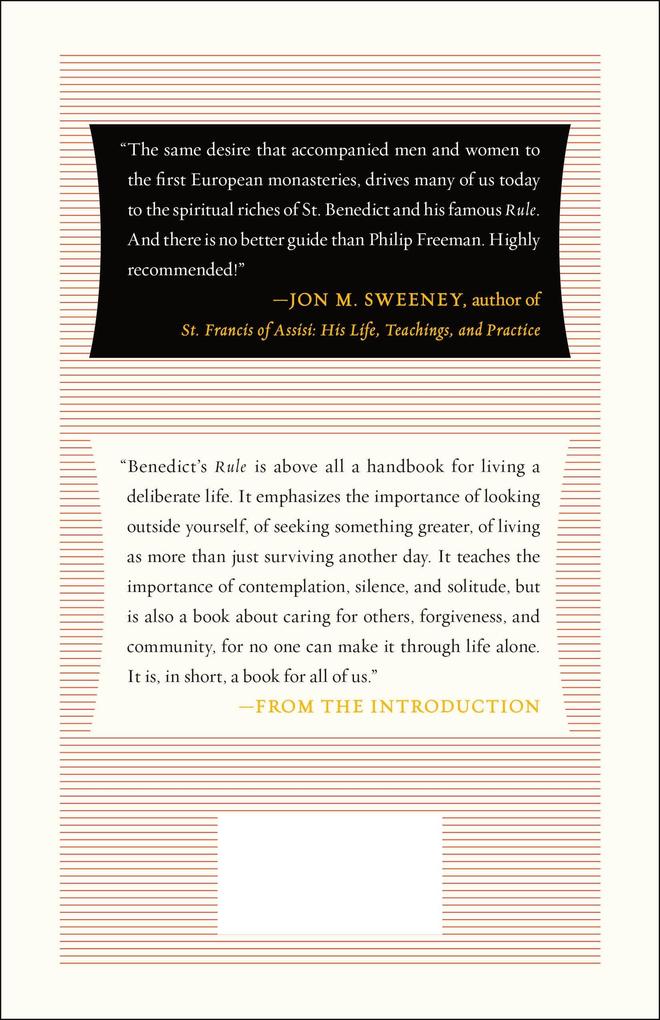
Zustellung: Mi, 06.08. - Di, 12.08.
Versand in 3-4 Wochen
VersandkostenfreiBestellen & in Filiale abholen:
A timeless source of wisdom for people looking to lead a life of simplicity, purpose, and serenity
The Rule of St. Benedict has governed monastic communities for centuries, but it is far more than a standard religious text. The Rule is, above all, a handbook for living a deliberate life-no matter your religious background or beliefs. It teaches the importance of contemplation and silence, of solitude, and the power of community and unity.
With lessons focusing on the simple acts of everyday life, like eating and daily work, along with wisdom for the deeply personal and internal facets of living, such as cultivating humility and practicing forgiveness, The Rule of St. Benedict is a profound guide to living a good and meaningful life.
An award-winning translator, Philip Freeman's version of The Rule is beautifully accessible in its language. With a simple and direct style, the book lays out a way of living that is transformative in its simplicity and striking in its power.
The Rule of St. Benedict has governed monastic communities for centuries, but it is far more than a standard religious text. The Rule is, above all, a handbook for living a deliberate life-no matter your religious background or beliefs. It teaches the importance of contemplation and silence, of solitude, and the power of community and unity.
With lessons focusing on the simple acts of everyday life, like eating and daily work, along with wisdom for the deeply personal and internal facets of living, such as cultivating humility and practicing forgiveness, The Rule of St. Benedict is a profound guide to living a good and meaningful life.
An award-winning translator, Philip Freeman's version of The Rule is beautifully accessible in its language. With a simple and direct style, the book lays out a way of living that is transformative in its simplicity and striking in its power.
Inhaltsverzeichnis
Introduction
The Life of Benedict of Nursia
Come and Follow Me: The Beginnings of Christian Monasticism
Darkness and Light: The Early Medieval World of Benedict
How to Be a Monk: The Prayerful and Practical Rule of Benedict
Sing, Work, Pray: A Day in the Life of a Monk
The Lasting Influence of Benedict's Rule
The Quiet Life: Ways to Read the Rule of Benedict
A Note on the Translation
The Rule of Saint Benedict
Prologue
1. The Different Kinds of Monks
2. What Kind of Man the Abbot Should Be
3. Summoning the Brothers for Consultation
4. The Tools for Good Works
5. Obedience
6. Silence
7. A Twelve-Step Program for Humility
8. The Night Vigil
9. The Psalms of the Night Vigil
10. The Night Vigil in Summer
11. Celebrating the Night Vigil on Sundays
12. The Celebration of Lauds on Sundays
13. The Celebration of Lauds on Ordinary Days
14. The Celebration of the Night Vigil on Saints' Days
15. When to Say the Alleluia
16. The Celebration of Holy Services During the Day
17. The Number of Psalms to be Sung at these Services
18. The Order of the Psalms
19. How We Should Sing the Psalms
20. Prayer
21. The Deans of the Monastery
22. Sleeping Arrangements
23. Separation from the Community
24. Degrees of Separation from the Community
25. Serious Offenses
26. Associating with those Separated from the Community
27. How the Abbot Should Care for those Separated from the Community
28. Those Who Refuse to Change their Ways Despite Frequent Warnings
29. Readmission of a Brother Who Leaves the Monastery
30. Correction of the Young
31. The Steward of the Monastery
32. The Tools and Goods of the Monastery
33. Private Property
34. Distribution of Goods According to Need
35. Working in the Kitchen
36. The Care of the Sick
37. The Elderly and Children
38. Reading at Meals
39. The Proper Amount of Food
40. The Proper Amount of Drink
41. Meal Times
42. Silence at Night
43. Latecomers to Worship Services and Meals
44. How to Make Amends
45. Mistakes in the Oratory
46. Other Mistakes
47. Announcing the Hours for Worship
48. Daily Work
49. Lent
50. Worshipping Away from the Monastery
51. Brothers on a Short Journey
52. The Oratory
53. The Welcoming of Guests
54. Letters and Gifts for Monks
55. Clothing and Footwear for the Brothers
56. The Abbot's Table
57. The Craftsmen of the Monastery
58. The Process for Joining the Monastery
59. The Offering of Sons to the Monastery by Nobles or the Poor
60. The Admission of Priests to the Monastery
61. Visiting Monks
62. Priests of the Monastery
63. Rank within the Community
64. Election of the Abbot
65. The Prior of the Monastery
66. The Doorkeeper of the Monastery
67. Brothers Sent on a Journey
68. The Assignment of an Impossible Task to a Brother
69. Defending Someone Else at the Monastery
70. Striking Someone at the Monastery Without a Cause
71. Mutual Obedience
72. The Beneficial Excitement of Monks
73. This Rule is Only the Beginning of the Journey
Further Reading
The Life of Benedict of Nursia
Come and Follow Me: The Beginnings of Christian Monasticism
Darkness and Light: The Early Medieval World of Benedict
How to Be a Monk: The Prayerful and Practical Rule of Benedict
Sing, Work, Pray: A Day in the Life of a Monk
The Lasting Influence of Benedict's Rule
The Quiet Life: Ways to Read the Rule of Benedict
A Note on the Translation
The Rule of Saint Benedict
Prologue
1. The Different Kinds of Monks
2. What Kind of Man the Abbot Should Be
3. Summoning the Brothers for Consultation
4. The Tools for Good Works
5. Obedience
6. Silence
7. A Twelve-Step Program for Humility
8. The Night Vigil
9. The Psalms of the Night Vigil
10. The Night Vigil in Summer
11. Celebrating the Night Vigil on Sundays
12. The Celebration of Lauds on Sundays
13. The Celebration of Lauds on Ordinary Days
14. The Celebration of the Night Vigil on Saints' Days
15. When to Say the Alleluia
16. The Celebration of Holy Services During the Day
17. The Number of Psalms to be Sung at these Services
18. The Order of the Psalms
19. How We Should Sing the Psalms
20. Prayer
21. The Deans of the Monastery
22. Sleeping Arrangements
23. Separation from the Community
24. Degrees of Separation from the Community
25. Serious Offenses
26. Associating with those Separated from the Community
27. How the Abbot Should Care for those Separated from the Community
28. Those Who Refuse to Change their Ways Despite Frequent Warnings
29. Readmission of a Brother Who Leaves the Monastery
30. Correction of the Young
31. The Steward of the Monastery
32. The Tools and Goods of the Monastery
33. Private Property
34. Distribution of Goods According to Need
35. Working in the Kitchen
36. The Care of the Sick
37. The Elderly and Children
38. Reading at Meals
39. The Proper Amount of Food
40. The Proper Amount of Drink
41. Meal Times
42. Silence at Night
43. Latecomers to Worship Services and Meals
44. How to Make Amends
45. Mistakes in the Oratory
46. Other Mistakes
47. Announcing the Hours for Worship
48. Daily Work
49. Lent
50. Worshipping Away from the Monastery
51. Brothers on a Short Journey
52. The Oratory
53. The Welcoming of Guests
54. Letters and Gifts for Monks
55. Clothing and Footwear for the Brothers
56. The Abbot's Table
57. The Craftsmen of the Monastery
58. The Process for Joining the Monastery
59. The Offering of Sons to the Monastery by Nobles or the Poor
60. The Admission of Priests to the Monastery
61. Visiting Monks
62. Priests of the Monastery
63. Rank within the Community
64. Election of the Abbot
65. The Prior of the Monastery
66. The Doorkeeper of the Monastery
67. Brothers Sent on a Journey
68. The Assignment of an Impossible Task to a Brother
69. Defending Someone Else at the Monastery
70. Striking Someone at the Monastery Without a Cause
71. Mutual Obedience
72. The Beneficial Excitement of Monks
73. This Rule is Only the Beginning of the Journey
Further Reading
Produktdetails
Erscheinungsdatum
01. Januar 2021
Sprache
englisch
Seitenanzahl
208
Autor/Autorin
St. Benedict
Verlag/Hersteller
Produktart
gebunden
Gewicht
332 g
Größe (L/B/H)
147/218/24 mm
ISBN
9781250246493
Entdecken Sie mehr
Bewertungen
0 Bewertungen
Es wurden noch keine Bewertungen abgegeben. Schreiben Sie die erste Bewertung zu "The Rule of St. Benedict" und helfen Sie damit anderen bei der Kaufentscheidung.










